
Hi, I'm Dilip. I'm an atheist. I'm also a stud.
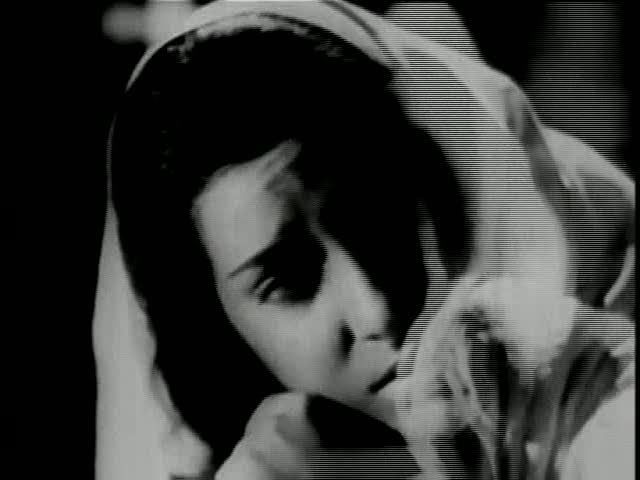
Hi, I'm Nargis. I'm a nun. See that bird fluttering over the superimposed image? That's my dil, trying to break free. Enjoy the angst!
Some films defy categorization. Films such as Dil Se and Awaara and now, Jogan (Yogi/Mendicant/Nun*). Neither mainstream nor arthouse, these films are difficult to describe, to pin down, because we can't compare them to anything else. They just are... how they are.
The story of Jogan is simple. According to the title credits, it was written by "?" - perhaps it's a traditional fable? Village atheist, Vijay (Dilip Kumar), is content with hanging around and avoiding the temple. One day, a traveling mendicant arrives - and this ascetic is none other than the gorgeous Nargis! Vijay is positively smitten, and suddenly going to temple doesn't seem like such a bad idea. However, the presence of a brooding hottie severely disturbs St. Nargis' peace of mind, and she repeatedly requests that he take his brooding butt and sit outside. He does, but then leaves flowers on her doorstep and engages in other manner of cuterie. St. Nargis' detached serenity just goes all higgledy piggledy.
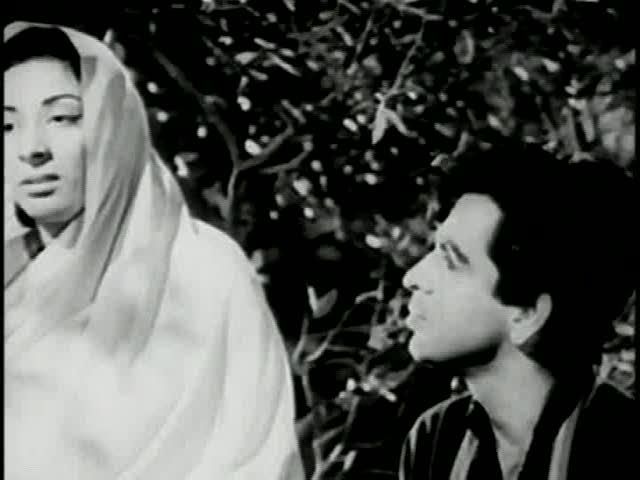
As Joss Whedon would say, he is starting to damage her calm.
When Vijay confronts her about the turmoil in her eyes, and asks her why she gave up the material world, she narrates a sad and sweet story when she lived as the secular, frothy Nargis we all know and love. The present tension between religion and securalism, theism and atheism, and to hottie or not to hottie ends on a sad, symbolic note.
We definitely haven't captured the vibe of the film - which is deeply rooted, enigmatic, Zen-like (if we may mix religions). It's... just difficult to write about, as we've never seen anything even resembling it. We can only liken its profound emptiness to the feeling we got sometimes reading J.L. Carr's A Month in the Country, which was similarly thoughtful and vast.

Sometimes nuns can doubt...

...and atheists can worship.
Jogan treats its story with the softest of touches - neither the atheist nor the ascetic are demonized for their choice, though their choices are gently explored. In one touching sequence, a holy man arrives at a courtesan's parlor where Vijay is lounging. Everyone hurries to greet the ascetic - Pranaam, Gurudev! Namaste! - and, embarrassed, they urge Vijay to do the same. Vijay is reluctant, he keeps his eyes lowered and says, Log mujhe nastik kehte hain. (I am called an atheist.) The holy man and Vijay banter and tease each other, and the ascetic praises Vijay's atheism as a form of secular humanism and an ultimate search for love: "I am an atheist like you, I am constantly searching for God. God is truth, beauty, happiness. I search for these things in the huts of the poor, you search for them here [in the courtesan's parlor]. Lord, your soul is in search of someone. Someday you'll make room for God in your heart." Smiling wryly, Vijay finally greets the ascetic, Pranaam, Gurudev.
Similarly, Nargis' choice to become a wandering nun is gently questioned by the head nun. When Nargis arrives at the nunnery, having escaped from her home, hurt and upset, she asks to seek refuge in God. The head nun warns her that becoming a mendicant is not something to rush into, it's not something that happens just because you "give up" on the world. Still, Nargis insists and the head nun yields. Throughout the film, a perturbed Nargis chants the peace (shanti) mantra, seemingly to little effect - but we don't think the film is necessarily showing the meaninglessness of religious devotion. Rather, by our reckoning the main message is finding the happy medium, a flexible yielding between the purely areligious and purely devotional life. Vijay and Nargis' character are both very young and passionate about their beliefs, and yet these beliefs - while ostensibly deriving from choices made for their own happiness - seem to give them nothing but trouble. Why not just give a little and not be so inflexibly atheistic/ascetic? Gosh!
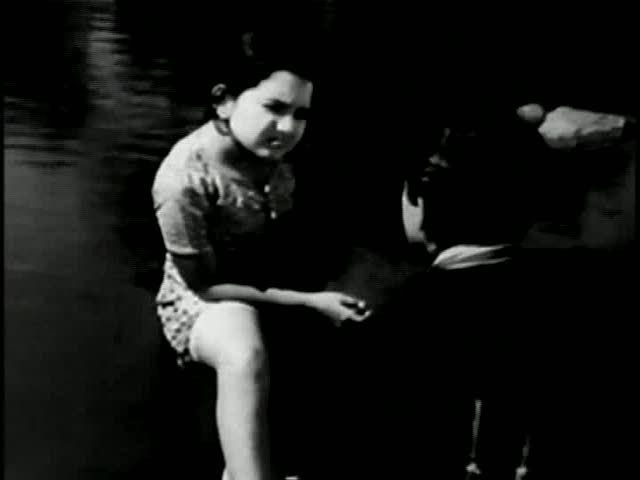
The relationship between this little firecracker and Dilip was adorable.
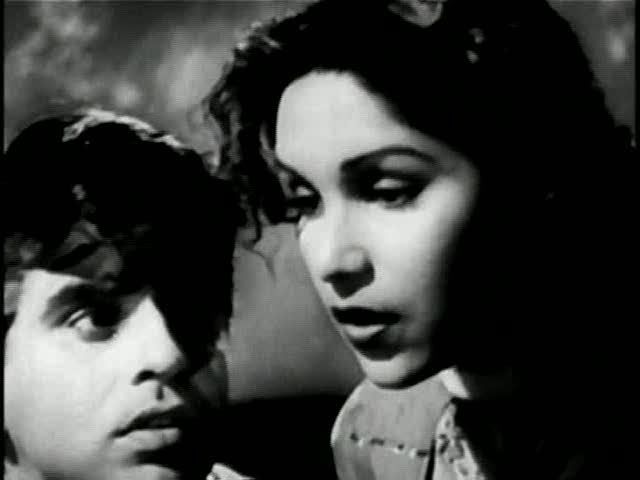
Dilip the atheist searching for God in the courtesan's parlor. Are you loving this movie? We are. Note the super-tight close-ups and the fact that they're both in each other's faces.
Both Nargis and Dilip Kumar do a very good job in their softspoken, sweet interactions. Dilip mostly maintains the same vibe throughout the film - dreamy-eyed and lovelorn - while Nargis demonstrates her formidable range as the ghost-like mendicant versus her former, high-spirited self. Watching her transform from one into the other is really quite sad.
The film's aesthetics, as we said, were hard to pin down. There were some cute, blunt symbols: such as when Nargis, after first meeting her admirer, escapes to her room and the picture of a fluttering, caged bird is superimposed over her. The director also favored incredibly tight close-ups coupled with minimalist composition, all contributing to the Zen look. Another really interesting thing: this might be the shortest Hindi film ever, clocking in at a mere 1hr 45min! Canst it be POSSible?! Just another thing to add to the list of Why Jogan Is So Unique.
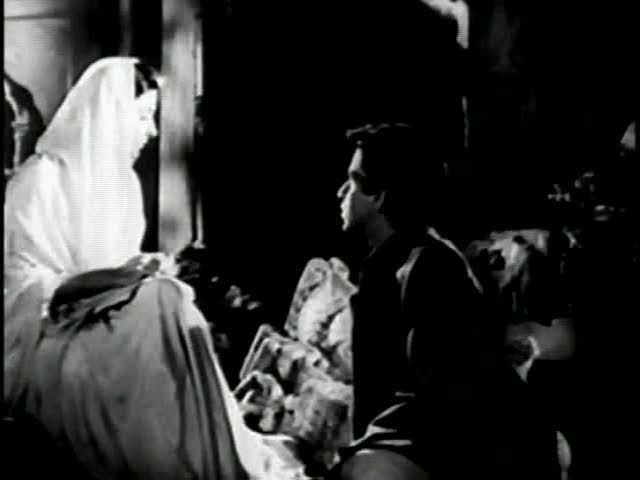
Oh Lord, can't we be friends?
* So we're using "nun", "mendicant", "ascetic" and "holy type person" interchangeably in this review. If you are any of the previously mentioned and wish to complain, please take it up in the comments. We love those.


9 comments:
I love this movie and the music as well. Thanks for the post.
I am so glad you saw this and liked it. I watched it a couple of weekends ago, and spent the rest of the day walking around with a serene smile.
At first, I was a bit annoyed with Vijay's persistence, but given how beautiful the object of his pursuit is, it is hard to blame him, and there also seems to be a large amount of curiosity in his pursuit. He just wants to know why.
The point about their choice not bringing them happiness is interesting. I am a bit familiar with Christian religious life, which obviously is very different in many ways, but there the point is made, that it is not really something you do because you want to be happy, it is something you do because all else seems hollow. There may be moments of sublime transcendence but generally it is hard work; and that seems to be what happens here, too.
is the courtesan in the movie, Kamini Kaushal? coz it looks a lot like her, and in a trivia book i read this was the movie that dilip fell for kamini in.
Wow, Dilip is the super-studly dude. This movie seems really interesting, but if the denouement is as traumatic as Dil Se's I might need therapy again. ;-)
Stella_1 - It is lovely, isn't it? Le sigh.
Gebruss - Totally agreed re: Dilip's curiosity. Even though on the face of it, it seems to be a typical filmi courtship - i.e. stalking until she relents! - given the starkly unique context, I thought it was far more palatable. Also, yes, Nargis is gorgeous!
Good point that the choices they've made - esp. Nargis - are more to do with discipline and renunciation. I suppose I meant "happy" in the sense that each of them, the atheist and nun, think of their decision as the "correct" one - the one that does, at least eventually, bring happiness (e.g. everlasting peace, heaven, etc.). Except they get nuffin but trouble.
Rum - OH, RUM! You are a wonderful source of gossip. I think it might be, and I think I read about this legendary crush, and how interesting!
Ajnabi - I was critical of Dilip's looks for very long, but he did have a very good period from like 1950-1955. And his angsty, low-key emoness renders him highly attractive.
It sounds so whimsical and mystical- all rolled up in 1! Thank you for letting us know about this movie...will def try to see it once!
Gosh! You write so well. Your review of jogan was superb. I am a film historian myself, i write on nostalgia regularly. I am also an avid collector of Bollywood memorabilia, including vintage posters. I can be contacted on 9820294153. My name is Ausaja
Oh how lovely to find someone in blog world who has seen this movie. Jogan is one of only 3 movies where I unequivocally love Dilip Kumar. I think you've captured the emotional, sexual, spiritual and philosophical tensions of the film beautifully in your review. And isn't it nice to see the gender reversal of the ascetic-tempted-by mortal-love theme.
I think I'm going to enjoy strolling through your blog, PPPC.
Dilip's last good film was ganga jumna (1961), the actor went into hibernation for 40 years and the star took over, the bangla film Sagina Mahato is a notable exception. His last credit was a double role in Qala, essentially a B grade mystery flick,but man did he look menacing in the negative part. As for his looks, he started in 1944 as a 20 year old, was too thin till about 1950, went a tad fat about 1961, IMO he looked best in Naya Daur, a great movie which similarly could not be categorized as arthouse or commercial. I think post 1960s he started to believe his own hype, coz people praised him as the greatest actor whatever he did. His performances in movies like Bairaag, Gopi, etc are embarrasing to watch.
Post a Comment